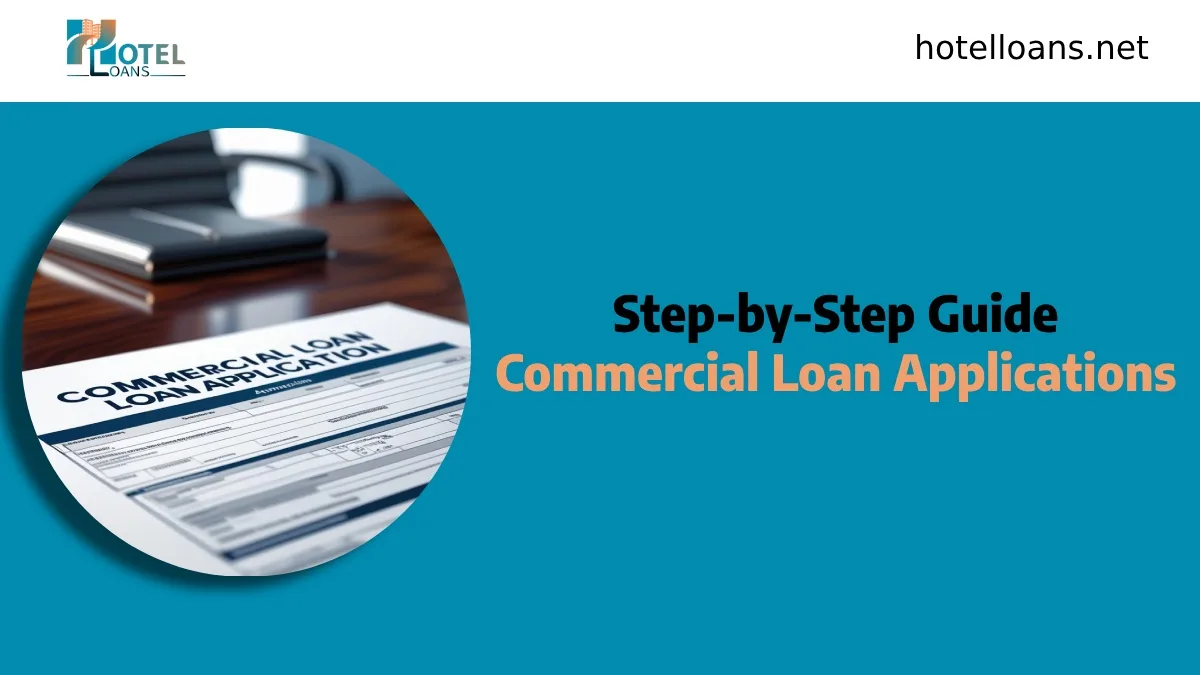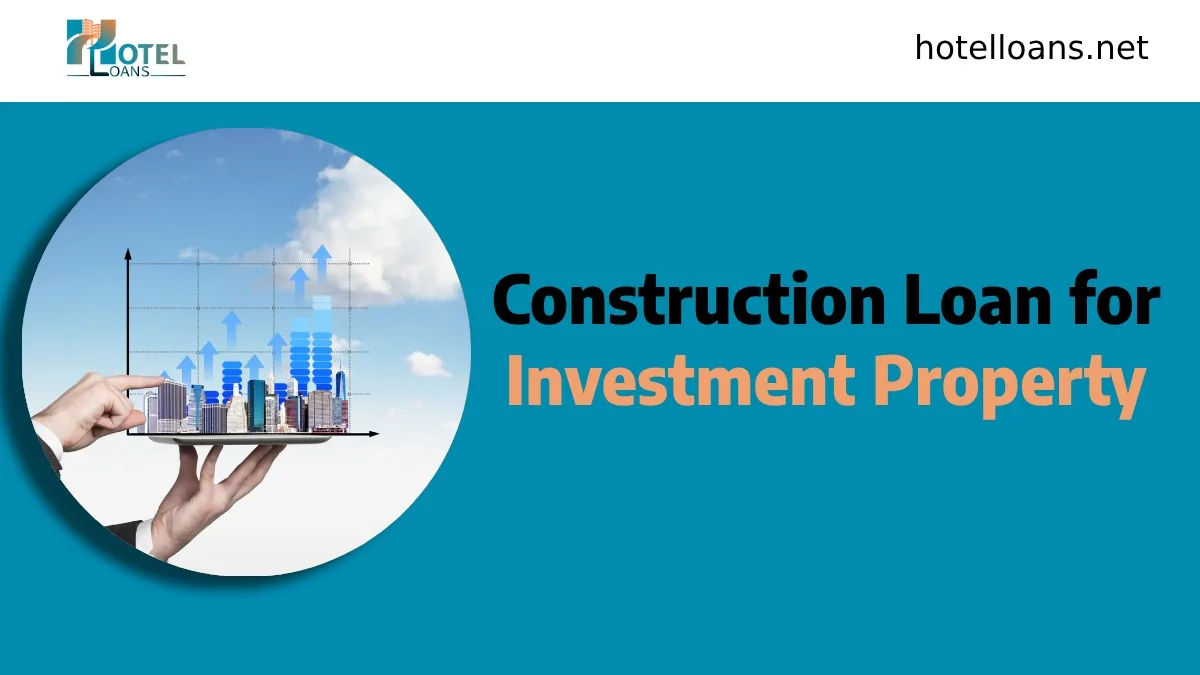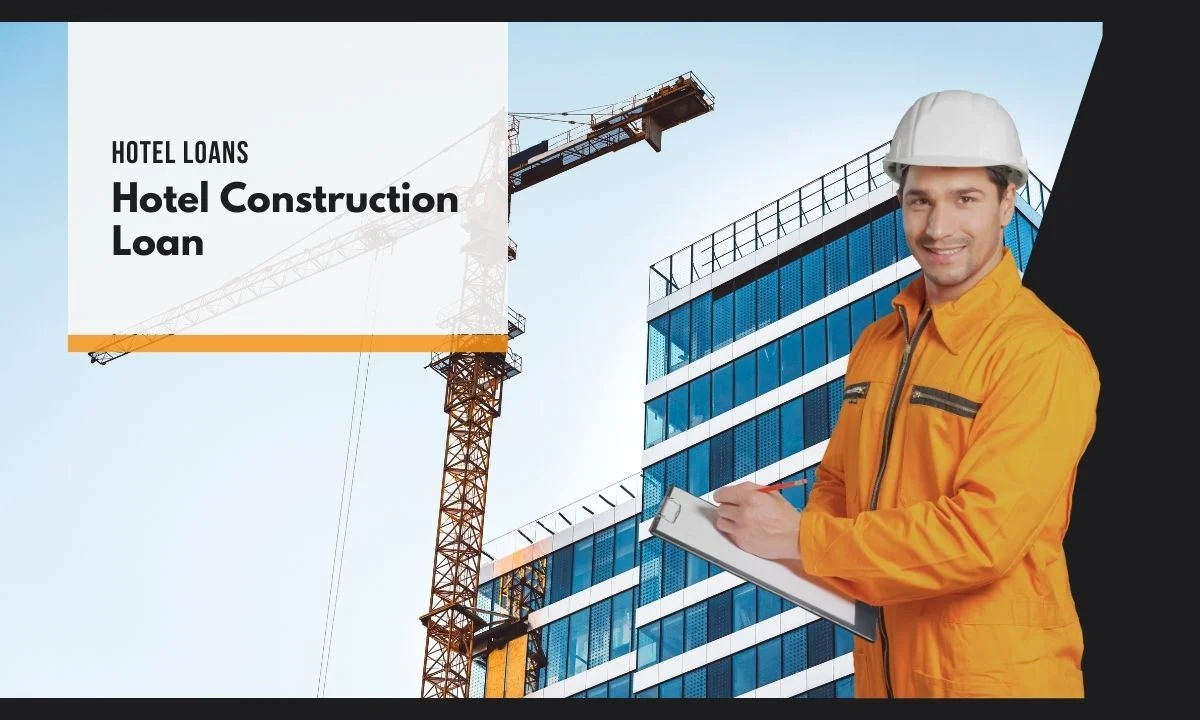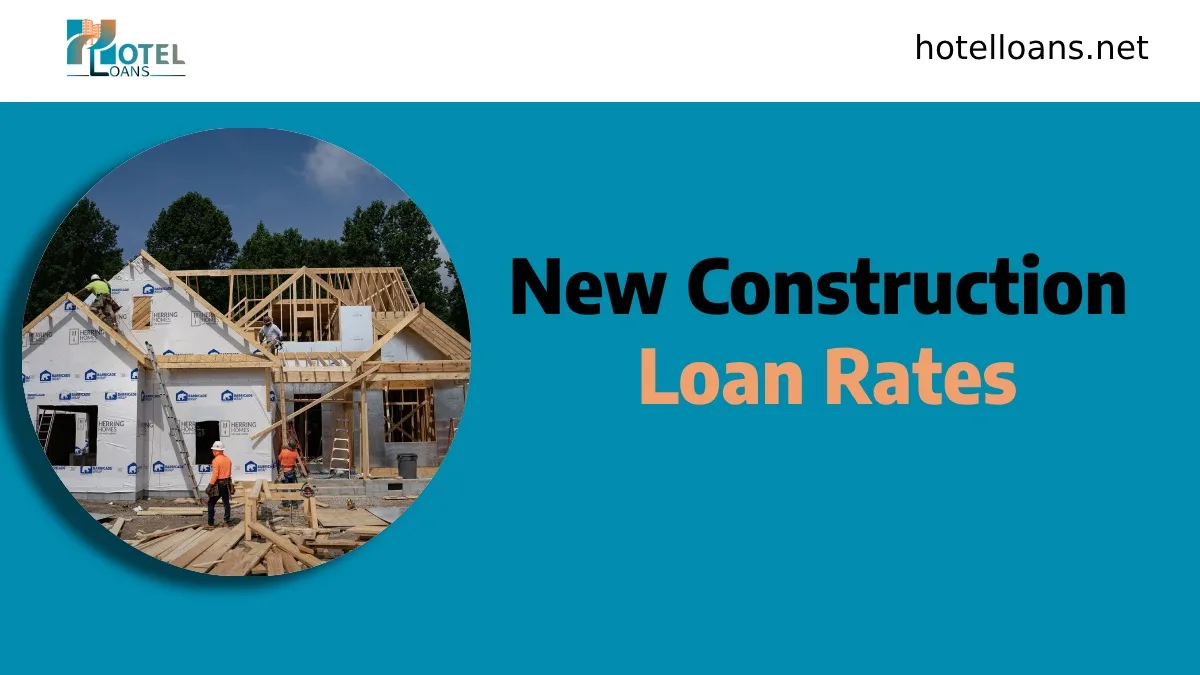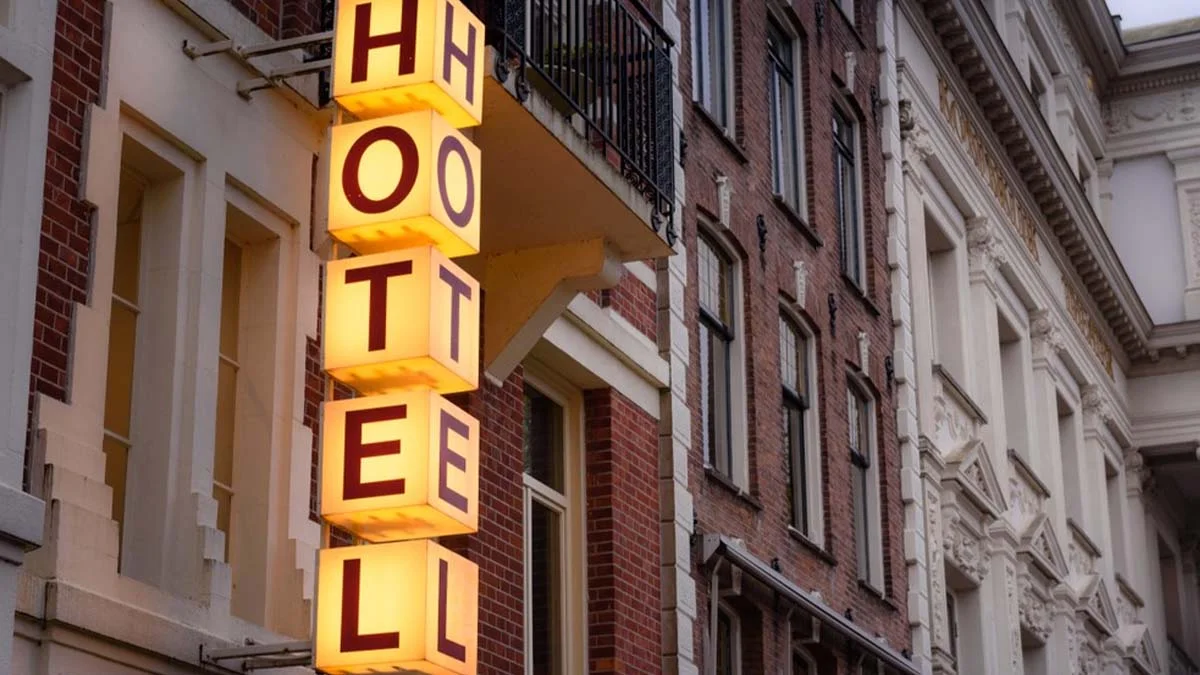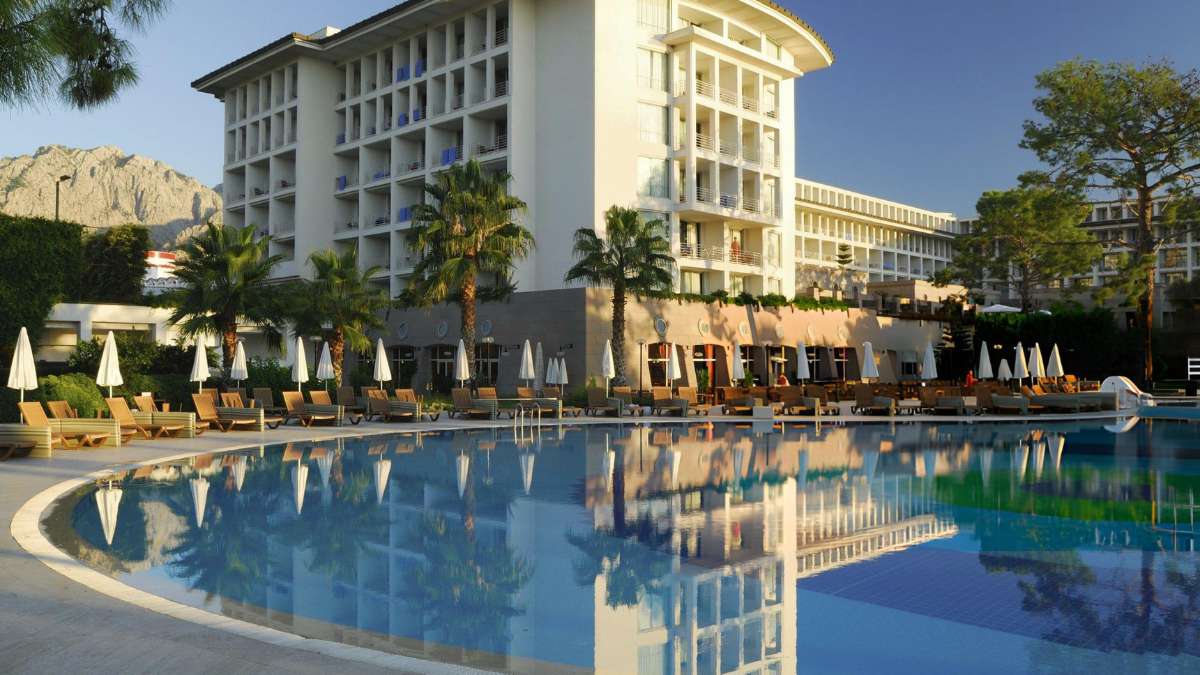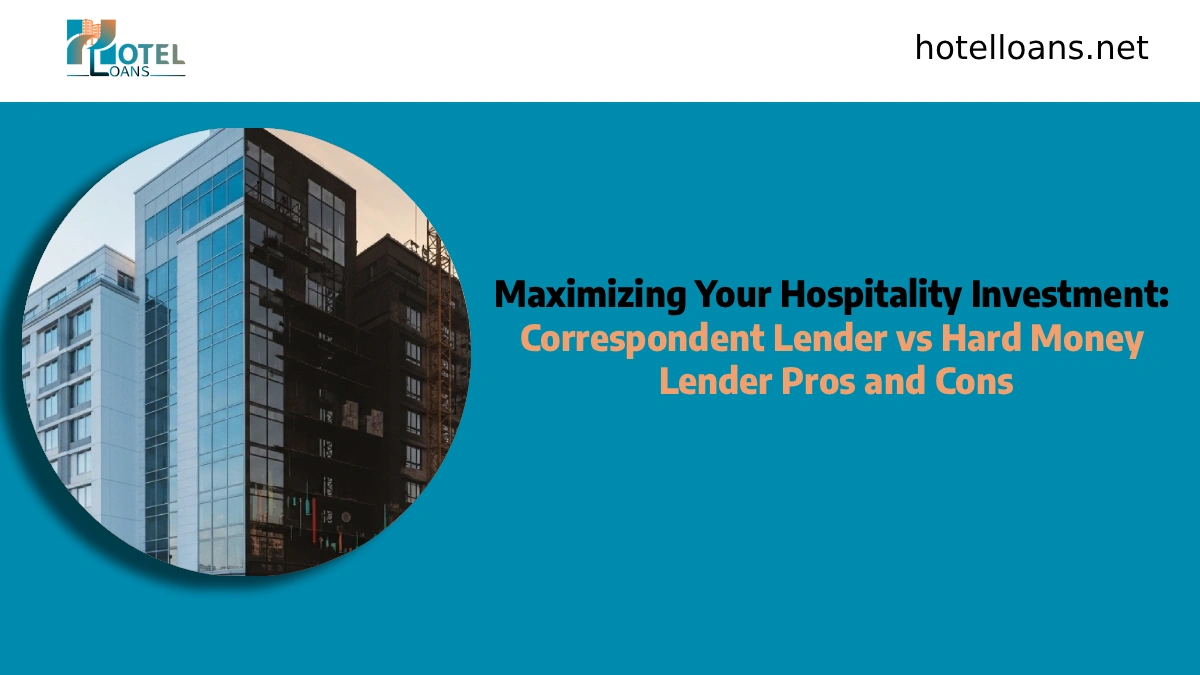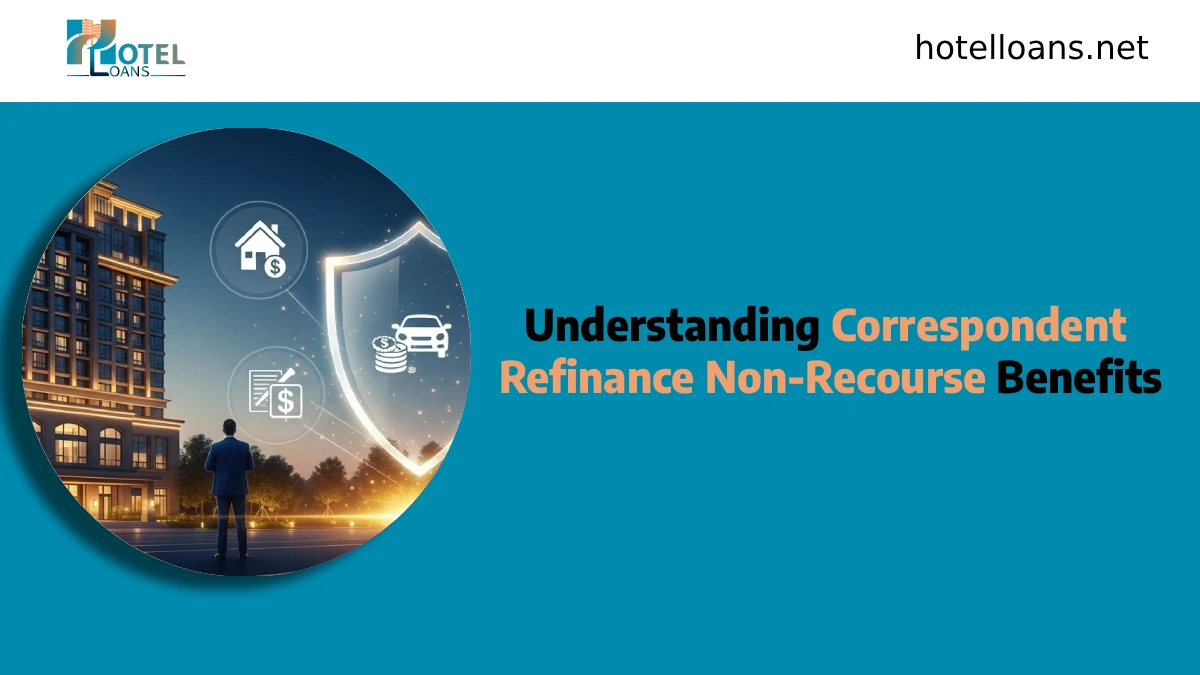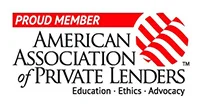People working in hotel real estate need to secure the right capital at all times. It’s not a choice; it’s the key to tremendous growth. A good “commercial loan application” is your golden ticket if you want to buy a new hotel, start a big construction project from scratch, or plan a clever renovation.
This in-depth help is meant to clear up the “application process” for hotel real estate projects. It will turn what looks like a challenging maze into a simple, doable road map. Business real estate financing can be complex and difficult to understand.
Still, you are aware of every step, from the initial financial analysis to the final funding. In that case, you can navigate it quickly and with confidence. This will enable you to make informed decisions that will help you succeed. Our staff understands the challenges of running a hotel, and this guide provides tailored assistance specifically designed to address your unique financial situation.
Table of Contents
ToggleUnlocking Commercial Loans for Your Hospitality Vision
What Exactly is a Commercial Loan?
A commercial loan is a challenging way for businesses to get the money they need for projects. Loans for people are not like this. It provides companies with the funds they need to grow, make informed investments, or manage their day-to-day operations.
Businesses primarily use this type of loan to cover essential expenses. Some examples of these costs include acquiring new tools for operations or expanding the business.
Lenders require a substantial amount of information before they will provide you with this critical money. This allows them to review your business’s finances and, most importantly, determine if it can repay the loan.
Why Does Hospitality Real Estate Need Specialized Financing?
A few key considerations to keep in mind before investing in hotel real estate are worth noting. This includes busy hotels, cozy motels, lively restaurants, vacation homes with lots of character, and places to play. These considerations are distinct from those you should consider when investing in other business properties.
When lenders evaluate these special types of homes, they typically consider more than just the borrower’s credit score. They examine the property’s past operations and its ability to generate revenue independently.
Several key factors influence the loan term and approval chances for hotel assets. This includes the number of guests, the business’s operational efficiency, and the current popularity of leisure and tourism.
Lenders need to adopt a specific approach when lending money to hospitality properties. Their daily pay fluctuates because it depends on the number of tourists.
This gives their businesses considerable freedom. A common type of business property, such as an office building, typically has safe, long-term leases. This is a very different case.
Moneylenders need to know these details to give you a fair risk rating and set up your loan correctly. Find a lender who has extensive knowledge of hotel assets to secure the funds you need. You can also get help from a business like HotelLaons.Net to find these loans. Because of this strategic alignment, your financing solution will perfectly meet the wants of the hospitality business.
Navigating the Landscape of Commercial Lenders
Various ways exist to finance hotel real estate. Multiple types of institutions exist here, each with its unique benefits.
Traditional Banks
Most of the time, these banks offer stable interest rates and long-term security. They typically require a higher credit score to obtain one. It takes longer and requires more paperwork to complete the application.
Individuals with good credit are generally more likely to secure loans from traditional banks. They also like to give money to projects they believe will be successful.
Private Lenders
With a private investor, you have more freedom. They can quickly obtain money and devise new ways to make deals easier. They are ideal for individuals who need to get approval quickly when purchasing a house.
They also help people whose earnings may not be sufficient for a bank. You can access a wide range of loan options through our extensive network of over 200 private lenders and real estate buyers. This is particularly helpful in specialized areas, such as housekeeping.
Construction lenders
They help fund large construction projects. This includes both starting from scratch and making significant changes to an existing building. They send money in stages or draws as they meet specific project goals. So they can keep track of the money-creation process while the work is going on.
Government-Backed Lenders
The Small Business Administration (SBA) offers numerous ways to support small businesses. This includes FHA loans for business sites and USDA Business & Industry (USDA B&I) loans. Some lenders are less likely to lose money when they lend money to small businesses through these schemes. Most of the time, this means lower interest rates and more time to pay back the loans.
There are now more types of loans and lenders to choose from. This shows that the market is moving toward more personalized lending options.
Diversification, on the other hand, makes it more difficult to obtain loans. No longer are traditional banks the only ones that can assist businesses with their financial needs. Borrowers now have more choices thanks to the many private lenders, building lenders, and government-backed programs available.
However, they also need to determine which one is best for their budget and construction project. This illustrates the importance of seeking professional financial advice. You can manage this complex system with the assistance of a skilled partner. You can save time and get better terms for your hotel business with their help.
Tailored Commercial Loans for Your Hospitality Investment
Choosing the right type of business loan is a crucial decision that will directly impact the success of your hospitality real estate project. Different types of loans are carefully designed to meet various needs, and each has its pros and cons.
Conventional Loans: Powering Established Hospitality Ventures
Banks and credit unions offer standard loans that are not backed by the government. They are called conventional loans. Most of the time, you can use these loans to buy current hotels, pay off other debts, or do big renovation projects. To obtain a standard loan, you typically need to demonstrate financial stability, have a high credit score (usually 660 or higher), and make a substantial down payment, which can range from 20% to 40% of the home’s price.
Government-Backed Options: Fueling Hospitality Growth
SBA Loans: Part of these loans are backed by the U.S. Small Business Administration, which makes lenders much less risky. Small companies in the hospitality industry can now obtain these loans more efficiently, thanks to government backing.
- SBA 7(a) Loans can be used for a variety of purposes. These loans can be used for various purposes, such as purchasing land and buildings, covering construction costs, acquiring tools, or providing working capital to hospitality businesses. Most of the time, these loans have competitive terms and extended repayment terms, which give businesses ample room to grow.
- SBA 504 Loans are specifically designed for stable assets, such as property and machinery. They are great for owner-occupied vacation homes because they usually require smaller down payments, sometimes as little as 10%.
USDA B&I Loans: As they are designed to support the economic growth of rural towns, these loans are particularly beneficial for hospitality businesses located in these areas. There is a discussion of FHA commercial property investment loans; however, the details are not provided. Therefore, it’s essential to note that these loans can only be used for specific types of commercial property.
Short-Term & Flexible Financing for Dynamic Strategies
Certain types of loans are designed to meet the needs of individuals who require quick access to capital or short-term financial solutions.
- Bridge Loans: These are short-term loans meant to “bridge the gap” between short-term funding needs and long-term funding options. They are often used for quick purchases, significant repairs (often as part of a “fix-and-flip” strategy), or to cover holding costs while waiting for permanent funding. For pressing needs, these types of loans can provide you with money quickly, sometimes within 48 hours.
- Hard Money Loans: These are an unusual type of lending based on assets. Most of the time, private lenders offer them. For these loans, the land itself serves as security rather than the borrower’s creditworthiness. This type of loan is suitable for individuals who may not qualify for standard loans or who require immediate funding.
- No-Doc, Lite-Doc, and State Income Loans are all options for individuals who lack traditional sources of income or have limited documentation to support their financial situation. Because the lender perceives a higher risk with these loans, the interest rates are typically higher.
You can obtain the money more quickly, but it comes at a higher cost (in the form of interest rates and other fees). The lender assesses your risk more closely, depending on the type of loan you choose. If you need money quickly, such as within 48 hours, hard money loans and bridge loans may be able to help; however, they typically come with higher interest rates and shorter loan terms. Standard loans or SBA loans, on the other hand, have better interest rates and longer loan terms. That being said, the entry process is stricter and takes more time.
Because of this vital link between cause and effect, people who want to borrow money must carefully consider what they need when selecting a loan, prioritizing either speed, low cost, or long-term security. For clients to fully understand these trade-offs and choose the best financing choice for their hotel construction project or real estate investment, they need to get financial advice from professionals.
Project-Specific Loans: Building Your Hospitality Vision
For new projects or significant residential repairs, you’ll need certain types of financial tools.
Construction loans are necessary for starting from scratch or making significant changes to places that serve food and drink. The loan money is given in stages, or draws, based on how well specific project goals are met. This helps maintain control over the flow of money during the building process. One way to invest in real estate using these loans is to purchase land and construct new homes. Another way is to fix-and-flip, fix-and-hold, or fix-and-rent business and hospitality locations.
Term loans can be used for a variety of purposes. Still, they are also commonly employed in the hotel industry to cover significant, one-time expenses or to support business growth.
Savvy real estate investors can utilize various types of loans to achieve their complex growth objectives in the hospitality sector. One type of short-term loan that is often used while waiting for more stable, long-term financing to become available is a bridge loan. A person could get a quick, hard money loan or bridge loan to buy an old motel as a business. They could then renovate it and either sell it or rent it out. You can refinance the property into a conventional loan or a DSCR loan when it is secure and making money for a fix-and-hold or fix-and-rent plan.
This multi-step process requires careful financial planning and highlights the importance of seeking professional assistance when navigating complex and evolving financing needs in dynamic real estate markets.
Income-Based Lending: DSCR Loans
The lender considers the property’s cash flow and its Debt Service Coverage Ratio (DSCR) more than the borrower’s personal income or tax returns when issuing a DSCR loan. For hospitality properties that generate revenue, this approach works incredibly well, as steady operating income is a key factor in demonstrating that the property can be repaid.
The table below provides a quick overview of the various types of business loans available to investors in the hospitality industry. This makes it easy to find good options for financing.
| Loan Type | Primary Purpose (Hospitality Focus) | Key Features | Ideal Hospitality Borrower/Property |
| Conventional Loan | Acquisition of stable hotel investment property, refinancing existing debt. | Competitive interest rates (varying), 5-30 year loan term, 65-80% Loan-to-Value (LTV) Ratio, 20-40% down payment, and weeks to months funding speed. | Experienced hotelier with a strong credit score; established a successful hospitality business. |
| SBA 7(a) Loan | Working capital for restaurant investment property, purchasing land/buildings for hospitality. | Competitive interest rates, up to 25-year loan term, lower down payments (often 10-20%), weeks to months funding speed, and collateral required. | Startup motel owner; small to medium-sized hospitality business needing flexible funds. |
| SBA 504 Loan | Owner-occupied motel investment property purchase, fixed asset acquisition. | Fixed interest rates, up to a 25-year loan term, as little as 10% down payment, 4-8 weeks funding speed, and real estate as collateral. | Owner-operator of hospitality business looking to acquire or expand their primary facility. |
| USDA B&I Loan | Rural recreation investment, property development, and economic growth in rural areas. | Competitive interest rates, extended loan terms, flexible collateral, and fast funding speed. | Hospitality businesses in designated rural areas are promoting job creation and economic growth. |
| FHA Commercial Loan | Specific commercial property types (details vary by program). | Terms and rates vary by FHA program, often for specific properties related to housing or healthcare. | Niche hospitality properties are eligible for specific FHA programs. |
| Bridge Loan | Quick fix and flip of a vacation investment property for short-term liquidity. | Higher interest rates, 6-24 month loan terms, 65-85% LTV, 15-30% down payment, often with a 48-hour funding speed. | Real estate investors need fast capital for distressed hospitality assets or temporary financing. |
| Hard Money Loan | Urgent funding for hospitality properties, asset-based lending. | Highest interest rates, 6-18 month loan term, lower LTV (50-75%), higher fees, days-to-weeks funding speed, and property as primary collateral. | Borrowers with non-traditional financial profiles or needing immediate capital for opportunistic deals. |
| DSCR Loan | Income-generating hospitality property (fix and hold, fix and rent). | Focus on property cash flow (DSCR 1.25+), competitive interest rates, various loan terms, and asset-based underwriting. | Real estate investors with substantial rental income but potentially limited personal income documentation. |
| Construction Loan | New ground-up construction of the hotel is a significant renovation project. | Funds disbursed in stages (money construction), variable interest rates during build, 1-3 year loan term (converts to permanent), project plans as collateral. | Developers for new hospitality projects, experienced builders for large-scale renovations. |
| Term Loan | Specific significant, one-time expenses or expansions in hospitality. | Fixed or variable interest rates, set loan term (e.g., 1-10 years), lump sum disbursement. | Established hospitality businesses seeking capital for a defined investment. |
| No-Doc/Lite-Doc Loan | Hospitality borrowers with non-traditional income or limited documentation. | Higher interest rates, shorter loan terms, fewer documentation requirements, and faster funding. | Borrowers seeking simplicity and speed are willing to accept higher costs. |
Your Step-by-Step Guide to a Successful Commercial Loan Application
A structured, proactive approach can make the process of applying for a commercial loan much easier and faster. Each step is crucial for constructing a strong case for lenders and securing the necessary funds.
Step 1: Clearly Define Your Project & Funding Needs
Before you begin any part of the application process, it is essential to understand why you need the money. One idea for a new real estate business is to buy land for a hotel. Another one is a large building project, such as starting from scratch to build a hotel. Finally, you can invest in a hotel, hospitality property, or other hospitality-related assets in various ways, such as “fix and flip,” “fix and hold,” or “fix and rent.”
Additionally, you need to be clear on how much of a loan you require, how it aligns with your business goals, and what kind of cash flow you anticipate. Your money may run out if you take too little or too much. If you take too much, the project may not have enough funds to move forward.
Step 2: Assess Your Financial Health & Creditworthiness
Lenders carefully look at your personal and business finances to get a good idea of how well you can repay the loan. Maintaining a high credit score is essential. This includes both your personal FICO score and your business credit score. Most of the time, loan terms and interest rates are more favorable if your credit score is 680 or higher. Telling lenders about any financial difficulties you’ve experienced in the past and having a clear plan for resolving them can make a good impression.
Additionally, it’s essential to be aware of the most critical business data. The Net Operating Income (NOI), the Debt Service Coverage Ratio (DSCR), and the Loan-to-Value (LTV) Ratio are a few of these. Lenders typically require a Debt Service Coverage Ratio (DSCR) of 1.25 or higher, indicating that the property’s income is sufficient to cover its debts. Additionally, they prefer Loan-to-Value (LTV) ratios that are lower, typically ranging from 65% to 80% for business buildings. It’s also beneficial for a borrower to have a past of running a business, preferably for at least two years, and to be good at managing their debt.
Step 3: Craft a Compelling Business Plan
A detailed business plan is a crucial component of any commercial loan application, as it demonstrates how your business operates, its current market position, and its growth potential. For hospitality businesses, this plan should include a comprehensive list of the niche market’s advantages and disadvantages, a description of how the business will differentiate itself from rivals, expected income and cash flow statements, and full biographies of the individuals who will be running the business.
It should be very clear in the plan how the borrowed money will help the company achieve its long-term goals and how the expected success of the company will facilitate the repayment of the loan. This comprehensive report serves as both a business plan and strong proof to the lender that they can trust you.
Step 4: Gather Comprehensive Documentation
A sign of professionalism is having all the necessary papers ready ahead of time. It significantly reduces the likelihood of delays in the application process. Usually, a detailed list of documents needed includes:
- Legal Forms for Businesses: Articles of Incorporation, business licenses, registrations, and joint agreements that are required.
- Financial Statements: The current balance sheet, profit and loss statement, and cash flow statement are all key financial statements. Adding aging records for accounts receivable and payable to financial statements is often a good idea.
- Tax Returns: Most of the time, you need to file federal tax returns for the last two to three years for both individuals and businesses.
- Financial Projections: Monthly predictions for the next year and yearly forecasts for the next three years provide insight into how things will unfold in the future.
- Details about the property (for CRE loans): This includes a running history, pro forma statements, rent rolls, and professional appraisals for loans secured by real estate.
- Details about ownership and management: Full bios of leaders, ownership shares, and Social Security numbers for key owners are required.
- Documentation for Collateral: If collateral is required, you should have documents such as real estate deeds, car titles, equipment appraisals, and inventory lists, as well as either a Letter of Intent (LOI) or a Purchase Agreement (if you intend to purchase something).
Step 5: Understand Loan Terms & Negotiate
When loan offers come in, they need to be carefully looked over. It’s essential to know exactly what to expect and what can be negotiated to secure favorable terms. Important things to look at are:
- Interest Rates: Understand the difference between fixed and variable interest rates and how they will impact your future payments.
- Loan Term: The length of time you have to repay the loan significantly impacts both your monthly payments and the total cost of the loan.
- Loan-to-Value (LTV) Ratio: This ratio indicates the level of risk associated with the loan for the lender. Lower ratios, such as 65–80%, are generally preferable for business properties.
- Charges and fines: Know all the costs that come with it, like the origination fee, the appraisal fee, the closing costs, any penalties for paying off the loan early, and any possible balloon payments.
It is essential to remember that negotiating is a standard part of obtaining a loan. Because of this, you shouldn’t be afraid to ask for lower fees, better interest rates, or more open loan terms.
Step 6: The Underwriting & Approval Process
In this step, the loan application for a business is carefully looked over. The underwriter’s job is to review all the information provided, including the applicant’s income, financial health, property value, ability to comply with the law, and overall risk rating. Lenders look at more than just the financial documents. They also examine the industry’s past, the company’s competitive position, the risk of concentration, and the size and experience of the management team.
Steps 1-4 are the first steps in planning. How well and quickly the insurance and approval phases go depends on how thoroughly you do these steps. Documents that are missing or not organized well, don’t explain financial problems, or don’t clearly outline how the loan will benefit the business are all common reasons for delays or outright rejections. If the financing team requests additional paperwork or information, please respond promptly to avoid any delays. A well-written application reduces the lender’s risk and the time required for thorough research.
This could help you secure a loan more quickly and on better terms, with more favorable interest rates. In this case, the insurer doesn’t just check to see if the rules are being followed; they also go out of their way to find out more about the danger. This can help a ready user by allowing them to address any concerns they might have ahead of time. In this way, the underwriting process becomes a group effort, which increases the chances of a successful result.
Step 7: Closing & Funding Your Hospitality Venture
Once the screening team has met all the requirements, the loan is approved. The final step to receive the money is to prepare the closing papers. These include the promissory note, mortgage, and deed of trust. A lawyer should carefully go over these, and then everyone should sign them. After the loan is signed, the money is generally wired directly to the business account or a title company. To ensure the repayment process goes smoothly, you need to know when the first payment is due and if there are any ongoing requirements.
Conclusion
To secure a commercial loan for the hotel building, it’s essential to consider the entire process ahead of time. To make this work, you need to know your financial requirements, carefully plan your finances, have a solid business plan, and be involved in the loan process. A bank is one place where you can borrow money. You can also consider using private loans, government-backed programs, or alternative lenders. Both have their advantages and disadvantages in different ways. In today’s fast-paced real estate market, it’s essential to understand how factors such as loan terms, interest rates, and funding speed (some loans can be funded in as little as 48 hours) interact with one another.
Careful planning, from determining the job size to obtaining all necessary paperwork, has a direct impact on the speed and ease of the approval and underwriting stages. A well-written application for a business loan can do more than just speed up the process. It can also help you secure a loan with more favorable terms and rates. It’s not just about securing the right loan; it’s a long-term strategy that can help your hotel real estate business grow and increase its value.
Partner with HotelLaons.Net and work with a company that has been giving loans for 30 years. These individuals also have extensive connections with private lenders and property owners who can assist you throughout every step of the commercial loan application process.
FAQs
What happens if I miss a payment on my commercial loan?
Failing to make a payment on your business loan on time can have adverse effects, such as lowering your credit score and potentially leading the lender to take legal action against you. If you have trouble making a payment, contact your lender immediately to explore your options. If you don’t, you may lose the asset due to cash flow problems or a decline in its value.
Can I pay off my commercial loan early?
You can pay off your business loan early with many companies. However, it’s essential to carefully review your loan agreement because some lenders may impose “prepayment penalties” to compensate for the lost interest income. There are different types of structures for these fines, such as a flat percentage, a step-down penalty that goes down over time, or a yield maintenance penalty.
Are commercial real estate loans only for large corporations?
No, big businesses aren’t the only ones who can get industrial real estate loans. These loans are also available to small businesses and individual investors who meet the lender’s requirements for creditworthiness and financial security. The United States has about 33.2 million small businesses. Many of them use commercial loans to finance their real estate needs.
Can I get a commercial real estate loan with bad credit?
You can obtain a business real estate loan even if your credit isn’t perfect; however, having good credit is usually beneficial because it allows you to secure better terms. Some lenders, such as private lenders and micro-lenders, offer options for individuals with poor credit, including hard money loans or loans with stricter terms and higher interest rates. People with poor credit may still be eligible for startup funding from even government-backed schemes.
What is a balloon payment in a commercial loan?
A balloon payment is a large payment due at the end of the term of a business loan. These are typically loans with shorter terms and longer amortization periods. With this structure, monthly payments are lower because the loan is repaid over a longer period of time. However, at the end of the loan’s term, a significant payment or refinancing is required to cover the remaining debt.
